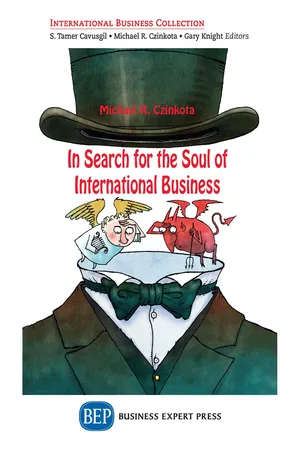![]()
PART I
On Touching the Good Soul
![]()
CHAPTER 1
The Soul and the Curative Marketing Concept
Three score and 17 years ago, Joseph Schumpeter regaled us with the concept of creative disruption. He presented successful innovation as only a temporary market shift, which, though threatening the profits of old firms, was itself facing the pressure of new competitors commercializing their own inventions. Such continuing cyclicality was taken on in greater detail by various subfields in business and society and delivered high explanatory value. Consider the link between transportation capabilities and market reach. See the time–service linkages developed by Hollander’s “wheel of retailing.” He postulates that firms tend to start at the bottom of the wheel and move up in terms of services and pricing until more efficient competitors transition them out from the wheel.
Today, disruption has become broader in scope with more new entrants, and with their disruptions coming not just from the same industry or even from similar business models. A representation of disruption reflects a continuous flow of newly entering players emanating from different countries and regions. To countermand aggression, it is no longer sufficient to force besieged firms to simply lower their prices. Nowadays, there can be entirely different products, which deliver better value to consumers. Unicorn companies, like Twitter and Netflix, are startups valued at more than US$1 billion within a very short time. Unicorns have succeeded and caused many casualties with their winner-takes-all market approach. When Netflix emerged in 1997, with its lower price and convenience, it quickly permanently overtook Blockbuster, the video rental firm. With its 10,000 retail stores, the firm was forced to declare bankruptcy in 2010.
But with the world becoming more dynamic and divided than ever before, security and religion appear to be held in higher esteem by society than economics and business. Corporations are increasingly expected to play a stronger role as a collaborator with government and society in finding solutions to often-unforeseen future challenges. Winner-takes-all competition begins to give way to a strategy based on global collaboration. Money no longer is the only or ultimate outcome of business efforts. Firms who neglect holistic perspectives and argue based on business principles alone may increasingly find themselves on the losing end. Self-sufficient, societally supportive, and leading is how many business executives like to see themselves. Yet, their activities are only one slice of a floating sphere formed by a score of other components integral to society.
This is one key reason for the emergence of the concept of curative marketing, which accepts responsibility for particularly international problems that marketing has caused. It then uses marketing’s capabilities to set things right even for the long term and works to increase the well-being of the individual and society on a global level. Curative marketing’s two key perspectives consist of looking back at what marketing has wrought and looking forward to set things right for future relations and actions. Curative marketing provides the concept and context for the assessment of participation.
![]()
CHAPTER 2
Freedom and Globalization: Simultaneously Possible
(With Valbona Zeneli)
Globalization, trade, and investment deserve our “thank you” for their achievements. Yes, currently, in Europe and the United States, popular discontent is forcefully expressed. An introvert trend has emerged, fed by nationalism, populism, xenophobia, and antiglobalization rhetoric.
Globalization is not new; it has existed for centuries. What is different today is the speed of globalizing the world, made possible by new technologies, transportation networks, media, and international marketing. Many claim that never before in history has there been so much evidence about strong opposition to globalization. However, any comparison with the past is highly inaccurate. Only few records of resistance to globalization have been preserved for us today.
One main feature of globalization in our age is the conveyance of freedom, which in turn becomes the foundation of good life. There are three dimensions to this freedom. For one, the opportunity to collaborate with others, streamline processes and procedures, and increase the variety of products and services cause great freedom of choice. There is the freedom conveyed by sovereignty, where nations and their governments maintain and exercise preferences for their citizens. Individual countries will always seek to have sovereign freedom. Then there is the freedom of principles and options.
Such freedom of choice is primarily expressed by the recourse to deeply rooted principles that provide the boundaries of the playing field. If there is no limitation and no alternative, then there is no freedom. A true alternative requires a decision and the exercise of virtue. If there are no principles to which one can seek recourse, there is no freedom.
In reciprocal causality, freedom both causes and facilitates international marketing, while international marketing is a key support of the cause of freedom. The focus and aim of international marketing is on crossing borders, with the goal of providing more choice for consumers and letting them be the ones to maximize their satisfaction. International marketing does so in all corners of the globe, the glamorous ones as well as in the small and remote ones where its efforts are not seen by others.
When the long-standing rivalry between socialism and market economy came to an end, market forces directly improved human rights and the extent of freedom. Exchanges through markets have clearly demonstrated greater efficiency and effectiveness in their ability to satisfy the needs of people. Now they must demonstrate their ability to persist through continuity and balance.
In spite of complaints about slowness of change, biases in wealth distribution, and economic disparities and inequalities, a majority of the participants in market-oriented conditions are now better off than they were before. World poverty has been reduced significantly. Only 25 years ago, almost two billion people, 43 percent of the world population lived in extreme poverty with less than $1 a day. Today, the poor have been reduced to 700 million people, or 9.6 percent of the world population that live with less than $1.9 a day. Research shows that globalizing developing countries grew 3.5 times faster than non-globalizing ones, over the last decades. Average incomes per capita have more than doubled in the last 25 years, from $4,192 in 1990 to $10,433 in 2015, and have increased 13 times from the 1970s, when they had an average income of $802.
One of the main discontents of globalization are low incomes in formerly successful regions, a high level of inequality within and between countries, and between the world’s economic classes. People at large will not tolerate such glaring inequality anymore.
One key dimension of freedom is to allow people outside the box. National borders are where business, government, and people usually find their limits. Freedom knows no international boundaries. It thrives on how to successfully cross national borders, on coping with local differences once the crossing is done, and on profitably reconciling any conflicts. Domestic borders limit economic expansion, while international approaches contain the freedom of much wider opportunities.
International activities encourage people all around the world. The antiglobalization narrative in Western European and the United States is caused by imbalances in both people and goods, as well as an intransigent enforcement of rules from disconnected centers. Migration and refugee pressures force people to move from rural homes into urban areas, from their developing countries into industrialized ones, and to take any measure to be relieved of wartime conditions. For both sides, little freedom is involved here. Most individuals who do the moving would much rather stay home but cannot afford to do so. The recipient countries might not want to welcome the refugees and migrants but have to do so in response to humanitarian pressures.
Globalization may have been part of what triggered some of these shifts and migrations, but it also can be instrumental in restoring the freedom to stem the tide. Globalization can provide economic opportunity and alternatives for individuals in their home countries, free from pressures to shift locations, so they can become productive economic contributors. To make globalization work, governmental, managerial, and corporate virtue, vision, and veracity are required. Trading and investment partners need to understand the current context and longer-term effect of policy and business actions taken. Joint actions based on mutual interests but also accepting divergent interests will make better outcomes not just possible but likely.
![]()
CHAPTER 3
Why International Marketing Strengthens Freedom
You may ask what freedom has to do with international marketing. Freedom is about options. If there is no alternative, there is no freedom. A true alternative provides the opportunity to make a decision, to exercise virtue. In the blaze of the klieg lights, it is easy to make the “right” decision. That is not an exercise in virtue, because real alternatives are effectively removed. The true selection among alternatives takes place in the darkness of night when nobody is looking.
The focus and aim of international marketing is on crossing borders. The goal is to provide more than one choice for customers, letting them pick from a selection of options in order to maximize their satisfaction. International marketing does so in all corners of the globe, the glamorous ones as well as in the small and remote ones where others do not see the efforts. By operating both in the limelight and also well outside of it, international marketing offers the freedom to exercise virtue both to the seller and the buyer—be it in decisions of supplying or purchasing, pricing or selecting.
Another key dimension of freedom is not to confine, but allow people to go outside of the box. As a concept, freedom knows no international boundaries. But national borders usually are the box where business and government find their limits. Such borders are a mere point of transition for international marketing. The discipline thrives on understanding of how to cross national borders successfully, on coping with the differences once the crossing is done, and on profitably reconciling any conflicts. International marketing contains the freedom of almost unlimited growth potential. Activities confined to domestic borders may well run into limits of expansion.
International market opportunities relax these limits quickly. Instead of restrictions, the international marketing paradigm encourages the stripping away of restraints; instead of limitations, there is the encounter of wide opportunity. Hayek thought that freedom also means not being forced to do something one does not want to do. There are economic migration pressures that force people to move from their rural homes into urban areas, from their developing countries into industrialized ones, or from wartime conditions to peaceful environment. Industrialized nations, in turn, speak about immigration pressure. For both sides, little if any freedom is involved here. Most individuals who do the moving would much rather stay home but cannot afford to do so due to major exigencies. The recipient countries might not want to welcome the migrants but do so in response to political and humanitarian pressures.
International marketing may have been part of what triggered some of these migrations, but it also can be instrumental in stemming the tide. It can provide the economic opportunity for the individuals at home so that they need not migrate. Thus, it lets individuals become productive contributors to the global economy free from pressures to shift locations. When the long-standing rivalry between socialism and market orientation was resolved, market forces and the recognition of demand and supply directly affected human rights and the extent of freedom. With all humility and gratefulness, we can conclude: Markets were right! In country after country, market forces have demonstrated typically greater efficiency and effectiveness in their ability to satisfy the needs of people. International marketing has been instrumental in stimulating these newly emerging market forces. In spite of complaints about the slowness of change, biases in wealth distribution, and the inequities inherent in societal upheavals, a large majority of participants in market-oriented cond...




